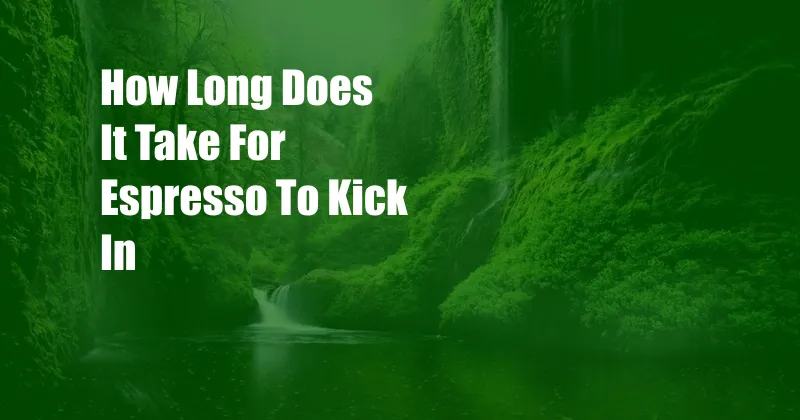
The Espresso Effect: Speed, Intensity, and Duration
Espresso, the concentrated shot of coffee, has become a worldwide sensation. Its rich aroma and invigorating effects have captivated coffee enthusiasts for generations. But how long does it take for espresso to kick in? Join us as we explore the fascinating journey of espresso’s impact on our bodies.
The Road to Stimulation: Caffeine’s Timetable
Caffeine, the primary active ingredient in coffee, is responsible for its stimulating effects. Upon consumption, caffeine is absorbed into the bloodstream through the digestive tract. It takes approximately 15-45 minutes for the caffeine in espresso to reach its peak concentration in the blood. This window of time allows for the onset of espresso’s alertness-boosting effects.
Factors Influencing Espresso’s Timeline
Several factors can affect how quickly espresso’s effects set in:
-
Individual Metabolism: The rate at which your body metabolizes caffeine varies from person to person. Those who metabolize caffeine more rapidly may experience its effects sooner.
-
Food Consumption: Ingesting food before drinking espresso can slow down caffeine absorption, delaying its onset.
-
Caffeine Tolerance: Regular caffeine consumption can lead to tolerance, requiring higher doses for noticeable effects.
The Peak of Espresso’s Power
At its peak, espresso’s effects are unmistakable. Increased alertness, sharpened focus, and a boost in energy levels are commonly reported. This heightened state of consciousness can last for 2-4 hours, providing sustained stimulation throughout the morning or afternoon.
The Gradual Decline: Caffeine’s Exit
After reaching its peak, caffeine’s effects gradually diminish as it is metabolized and excreted by the body. The half-life of caffeine, the time it takes for the body to eliminate half of its original concentration, is about 5-6 hours.
Tips for Maximizing Espresso’s Effects
-
Consume on an Empty Stomach: Ingesting espresso before eating allows for faster absorption.
-
Opt for a Double Shot: Doubling the amount of espresso increases caffeine content, enhancing alertness.
-
Choose a Darker Roast: Darker roasts typically contain higher levels of caffeine.
Expert Advice: Getting the Most from Espresso
-
Hydrate: Caffeine has a diuretic effect, so drink plenty of water before and after espresso to stay hydrated.
-
Listen to Your Body: Pay attention to how espresso affects you and adjust your intake accordingly.
Frequently Asked Questions
Q: Why does espresso kick in faster than regular coffee?
A: Espresso is a more concentrated form of coffee, providing a higher caffeine dose in a smaller volume.
Q: How long does it take for espresso to wear off?
A: The effects of espresso typically subside within 2-4 hours, but the exact duration varies based on individual factors.
Q: Is it safe to consume multiple espresso shots per day?
A: While moderate caffeine intake is generally safe, excessive consumption can lead to side effects such as anxiety, insomnia, and heart palpitations.
Conclusion
The journey of espresso’s kick-in time is a unique and individualized experience. Understanding the factors influencing its speed and duration allows us to optimize its effects. By employing the tips and expert advice provided, you can harness the power of espresso to enhance your alertness and productivity throughout the day.
Are you an espresso enthusiast eager to delve deeper into its mysteries? Share your experiences and ask any lingering questions in the comments below. Together, let’s unravel the complexities of espresso’s invigorating embrace.